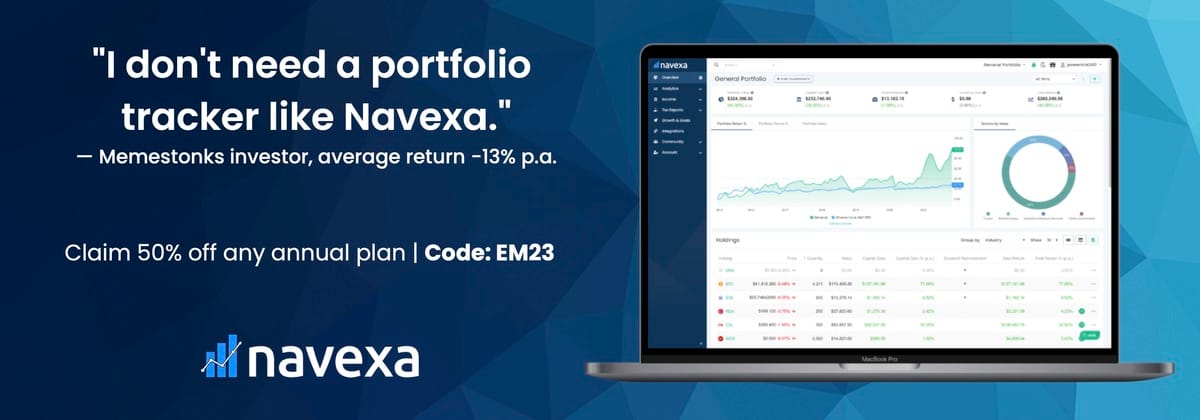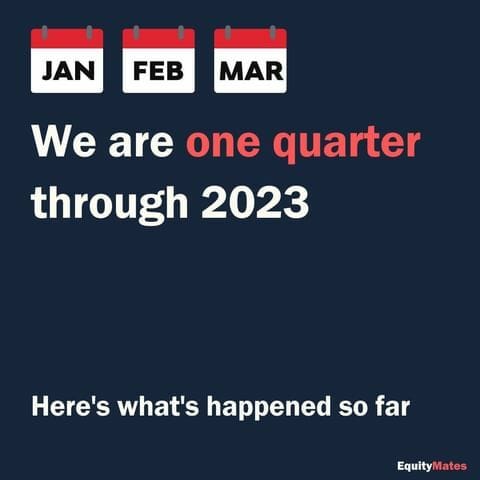- Equity Mates
- Posts
- 📈 Make budgeting feel less like a chore
📈 Make budgeting feel less like a chore
A collection of our favourite articles from the past week
Thought Starters

One quarter down, here’s what we’ve learned
Three months down, nine to go. We entered 2023 holding our breath feeling like there was bad economic news around the corner. We hope you took a deep breath because one quarter in, it feels like we’re still holding.
On our Instagram page this week we posted a look at how some of the key global markets have started 2023. The takeaway - not bad. Australia up 4%, USA up 7% and China up 5%. Not too many people would’ve predicted that at the start of the year.
And for us, this is just our latest reminder that predicting the short term movements of the market is a fraught exercise. People far smarter and far more experienced that us were saying 2023 could be a year when the stock market fell 20%. It still might. But if we’d followed those experts’ predictions we’d have lost money in the first quarter.
When it comes to investing there are some simple facts that lead to an even more simple conclusion:
No one can predict the short-term movements of the stock market
If you missed the stock market’s best 10 days over the past 30 years, your total return would’ve been cut in half
Over any 20 year period, the stock market has finished higher
For us, when we combine these three facts there is one unavoidable conclusion - don’t try and predict the stock market. Instead invest consistently so we don’t miss out on those few good days.
Here at Equity Mates, that’s what we’ve been doing. And no matter what the experts come out and forecast for the coming three quarters, that’s what we’ll keep doing.

How to make budgeting feel less like a chore
This collection of articles from Pocket is a great look at different tips and tricks to get you on top of your budget. From an introduction to the Japanese art of Kakeibo to a Yale Professor’s review of the 50 most popular personal finance books, there’s plenty in here to get you thinking about how you manage your money.
We love some of these articles and wanted to share the collection because we think others will get value out of it as well. But it is important to remember that personal finance is exactly that: personal. There is no one right way and no one-size-fits-all answer. At its core, all of the budget templates and spend tracking apps in the world are trying to get you to be aware and intentional. To know where your money is going and to consider if that is what you want. So the most important thing when it comes to personal finance and budgeting is to find a system that works for you and that fits how you think about and manage your money.
So read these articles, get what you can from them, and then if you decide it doesn’t work for you don’t hesitate to throw it away. At the end of the day budget culture is much like diet culture. There are hundreds of different diets and eating fads that ultimately want to get you to the same place - energy in less than energy out. Budget culture has plenty of different paths to the same destination - money in is more than money out. We all just need to find the right path for ourselves.
Highlights from Jamie Dimon’s 16,000 word shareholder letter
Jamie Dimon, the CEO of JP Morgan Chase, is one of the most respected business leaders around the world. He has recently published a monster of a shareholder letter - 16,000 words covering everything from AI to interest rates. Quartr have done the hard work for us and in this Tweet thread they pull out 15 of their highlights.
From his position leading one of America’s largest banks, Dimon seems to think that the economy and the consumer is holding up okay. He believes that before the collapse of Silicon Valley Bank, America’s economy may have been heading for a soft landing. Even with the collapse of Silicon Valley Bank, he writes, we are not even close to a 2008-like crash.
He also writes about competition and the future of finance. For years, Apple has been slowly making their way into banking and financial services. Firstly with the Apple Credit Card, then with Apple Pay and more recently with an Apple Buy Now, Pay Later offering. Dimon writes about the growing competitiveness in the banking space and where he thinks JP Morgan Chase has an advantage.
Matthew Ball: The Streaming Book
Matthew Ball has become notable in tech circles over the past few years for his writing on emerging technology trends and the metaverse. In this ‘mini-book’ he has put together a full account of the emergence of online streaming. The book is broken into four parts and is all available for free on this website.
The first part introduces the book and the “streaming wars”. Then the following three parts track the three phases of this industry as Ball sees it. Firstly, access-based competition which was the era that Netflix pioneered by establishing online video streaming as a way to access content. Then there was content-based competition, the era that we are in now where there are a number of streaming competitors trying to win and retain customers with the quality of their content. Over time, Ball thinks we will enter a third era of this industry - platform-based competition.
Platform-based competition will be an era where these streaming companies use their video platforms to sell a whole lot of other products and services. Standalone streaming services won’t survive, instead a streaming service will anchor a larger platform. It is early days, but we are seeing signs of it. Disney+ is selling merchandise related to shows, Netflix has launched a fitness service and is experimenting with games, and Amazon’s Prime Video is promoting its other platforms like Twitch. For the streaming platforms, this may be the answer to one of their longest running challenges - very few of them have found a way to turn a profit.
Dedollarization is not a thing
One story that we’ve noticed popping up on our news feeds over the past few weeks has been the idea that countries like China and Russia are finding ways to cut out the US dollar from global trade. (A collection of these stories are included here) Labelled ‘dedollarization’ this has got people talking about what could happen if the US dollar lost its status as the global reserve currency.
It felt like we had heard this story before, so this article from Epsilon Theory was useful confirmation that this is a story that pops up every few years. The article pulls out very similar stories going back to the early 2000’s and then looks at what the data tells us. In 1989, 90% (out of 200% - because each currency transaction has two sides) of international transactions were settled in US dollars. In 2022, it was about 89%.
If you have a similar Twitter feed to us (and maybe this feels more like a sign that we need to change who we follow on Twitter), the next time you see a story about the fall of the US dollar, remember this article. And as if to prove the point even further, the article closes with a newspaper column from 1975 warning of the same risk as OPEC planned to cut links with the US dollar.
Over the long stretch of history, at some point, the US dollar will lose its status as the global reserve currency. But just make sure you’re taking these doomsday predictions from social media experts with a grain of salt. None of the data suggests that day is coming anytime soon.
This article is thanks to GlobalX ETFs
Six of the biggest trends in technology
From artificial intelligence to cybersecurity, the internet of things to telemedicine, the pace of change in technology is speeding up and it can feel hard to keep up.
Every month, GlobalX ETFs write their article ‘The Next Big Theme’ that keeps readers updated on some of the biggest changes in the biggest technological themes.
Here is their latest article for March 2023.
Thank you to Navexa for sponsoring this email
100 portfolios beating the ASX 200 by >30%
Even if you’re a hardened ‘buy the dip’ veteran building a long-term portfolio, there’s no denying 2022 was a brutal year to own stocks.
The ASX200 returned about -5.5%.
That’s nearly -19% worse than its 122-year average of 13.2%.
But for a particular cohort of our portfolio tracking platform’s community, 2022 was not a year to forget.
Navexa’s top-performing 100 community portfolios averaged a 12-month return of 27.4% in 2022.
A near 30% return, in a year when the ASX went backwards.
Even in an average year for the Australian stock market, returns like that would be impressive. But in a year like we’ve just been through, that’s remarkable investment performance.
What was their secret, you ask?
We could talk ticker symbols and diversification strategies. But the real story here is that these investors are doing something too few of us care to do in the course of building our portfolios…
They track their investment performance.
It sounds simple. And it is. But it’s also a powerful habit that truly successful investors employ as part of their wealth building strategies.
With Navexa, you know — down to the dollar and decimal place — exactly how you’re performing versus the market.
Disclaimer
All information contained at EquityMates.com and in any content produced by Equity Mates Media is for education and entertainment purposes only. Any advice is general advice only, and has not taken into account your personal financial circumstances, needs or objectives. It is not intended as a substitute for professional financial, legal or tax advice.
Before making any financial decisions you should read the Product Disclosure Statement (PDS) and, if you are unsure, consult a licensed financial professional.
Equity Mates Media operates under Australian Financial Services Licence 540697.
Equity Mates respects your privacy. All personal information collected is protected in line with Equity Mates' Privacy Policy.
Copyright © 2023 Equity Mates Investing Podcast, All rights reserved.




